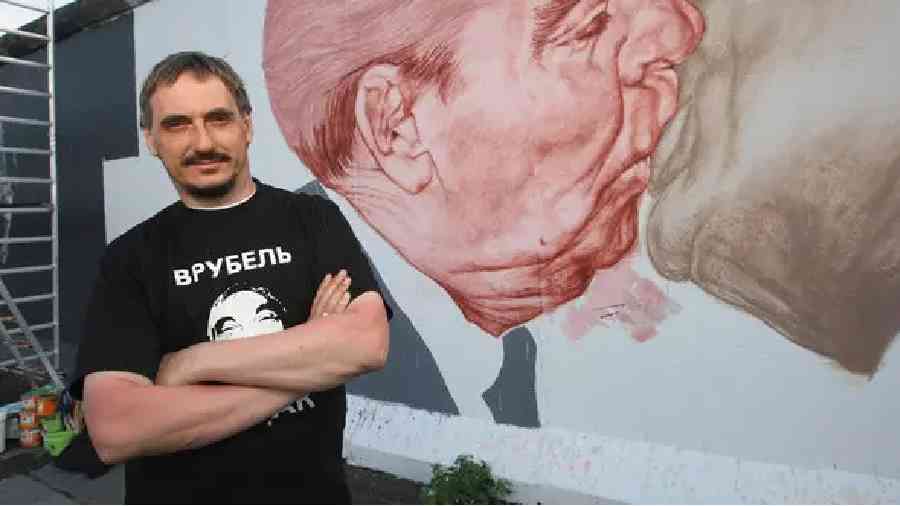Dmitri Vrubel, a Russian artist-provocateur best known for a startling mural on the Berlin Wall depicting the Soviet leader Leonid Brezhnev laying a fat kiss on the mouth of the East German leader Erich Honecker, died on Saturday in Berlin.
He was 62.
His wife and longtime artistic partner, Victoria Timofeeva, said the cause was heart failure related to a Covid-19 infection.
In 1990, the year Germany reunified, Vrubel was one of 117 artists from 21 countries to descend on a surviving stretch of the Berlin Wall, which had fallen the previous year.
With paint and a ladder, he recreated a larger-than-life version of a 1979 photo of a kiss between Brezhnev and Honecker.
Below it, he wrote a caption in Russian and German: “My Lord, give me the strength to survive this deadly love.”
By that time Communism was falling around the globe, and the Soviet Union was not long for this world.
Honecker was out of a job, and Brezhnev was dead. But the mural took on a life of its own as a subversive commentary on the dissolute ways of a dying system.
“More than any other work of art, it symbolizes the peaceful triumph over the seedy empire of antiquated Communist leaders,” the German newspaper Spiegel wrote in 2009.
The Berlin daily Tagesspiegel called it “a symbol of peace, love and transgression of all kinds”.
The image became an emblem of the freewheeling, graffitied, artistic Berlin of the 1990s. More than three decades on, it remains one of the most photographed murals in Berlin and is replicated on countless T-shirts, mugs and postcards.
Vrubel said he copied the image from a picture he saw in the French magazine Paris Match.
The photograph was taken by the French photojournalist Régis Bossu in 1979 in East Berlin, just a few miles from where it would later become famous, on the occasion of East Germany’s 30th anniversary.
Although the sight of two elderly heads of state engaging in a sloppy kiss on the mouth was shocking to many modern western viewers, many of whom assumed the image was purely the creation of the artist’s imagination, the gesture was a certain tradition among Communist leaders, who used it to symbolise their solidarity.
Gazprom in another halt to Germany gas flow
Gazprom, the Kremlin-controlled energy giant, says it will temporarily shutdown its gas pipeline to Germany at the end of the month for repairs, a move likely to trigger more uncertainty in Europe as countries struggle to compensate for cuts in Russian fossil fuels.
Gazprom says it will close the taps of the Nord Stream pipeline from August 31 to September 2 to replace a turbine with the help of its manufacturer, Siemens. Gazprom and the German government have already been trading blame for slowed flows of gas through the pipeline. Gazprom has said Western sanctions have slowed repairs, reducing gas flows by up to 60percent. Berlin has accused Gazprom of playing politics on Moscow’s behalf.
“The Russian side’s justification is simply a pretext, ”Robert Habeck, Germany’s economy minister, told reporters in Berlin in June.











